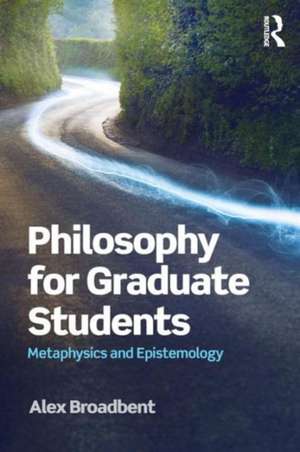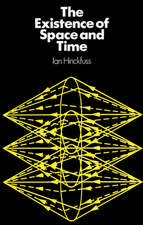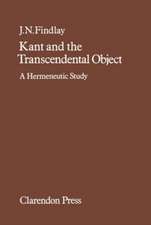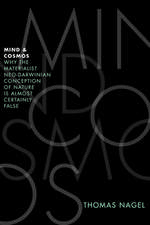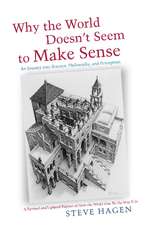Philosophy for Graduate Students: Metaphysics and Epistemology
Autor Alex Broadbenten Limba Engleză Paperback – 19 feb 2016
| Toate formatele și edițiile | Preț | Express |
|---|---|---|
| Paperback (1) | 373.35 lei 6-8 săpt. | |
| Taylor & Francis – 19 feb 2016 | 373.35 lei 6-8 săpt. | |
| Hardback (1) | 1084.38 lei 6-8 săpt. | |
| Taylor & Francis – 26 feb 2016 | 1084.38 lei 6-8 săpt. |
Preț: 373.35 lei
Nou
Puncte Express: 560
Preț estimativ în valută:
71.47€ • 74.40$ • 58.84£
71.47€ • 74.40$ • 58.84£
Carte tipărită la comandă
Livrare economică 31 ianuarie-14 februarie 25
Preluare comenzi: 021 569.72.76
Specificații
ISBN-13: 9781138930506
ISBN-10: 1138930504
Pagini: 176
Dimensiuni: 152 x 229 x 10 mm
Greutate: 0.25 kg
Ediția:1
Editura: Taylor & Francis
Colecția Routledge
Locul publicării:Oxford, United Kingdom
ISBN-10: 1138930504
Pagini: 176
Dimensiuni: 152 x 229 x 10 mm
Greutate: 0.25 kg
Ediția:1
Editura: Taylor & Francis
Colecția Routledge
Locul publicării:Oxford, United Kingdom
Cuprins
Part 1: Induction 1.1 Introduction 1.2 Learning from Experience 1.3 Generalizing the Problem 1.4 Attempted Solutions 1.5 The New Riddle of Induction 1.6 Key Concepts and Distinctions 1.7 Readings 2 Similarity 2.1 Introduction 2.2 One Over Many 2.3 Sets, Properties, Kinds 2.4 Realism 2.5 Nominalism 2.6 Key Concepts and Distinctions 2.7 Readings Part 3: Causation 3.1 Introduction 3.2 From Induction to Causation 3.3 What Is Causation? 3.4 Regularities 3.5 Counterfactuals 3.6 Deeper Questions 3.7 Different Questions 3.8 Taking Stock 3.9 Key Concepts and Distinctions 3.10 Readings Part 4: Laws of Nature 4.1 Introduction 4.2 Regularities 4.3 Sophisticated Regularity Views 4.4 Necessitation 4.5 Where Does This Leave Us? 4.6 Key Concepts and Distinctions 4.7 Readings Part 5: Meaning and Experience 5.1 Introduction 5.2 Verificationism 5.3 Difficulties for the Verification Principle 5.4 Analyticity 5.5 Does Quine Go Too Far? 5.6 Key Concepts and Distinctions 5.7 Readings Part 6: Reference 6.1 Introduction 6.2 Russell’s Theory of Descriptions 6.3 Rigid Designation and Semantic Externalism 6.4 Global Descriptivism 6.5 Key Concepts and Distinctions 6.6 Readings Part 7: Truth 7.1 Introduction 7.2 Correspondence 7.3 Coherence and Pragmatism 7.4 Semantic Theories and Deflationism 7.5 Truth and Relativism 7.6 Key Concepts and Distinctions 7.7 Readings Part 8: Mind 8.1 Introduction 8.2 Substance Dualism 8.3 The Problem of Interaction 8.4 Property Dualism 8.5 Objections to the Knowledge Argument 8.6 Mental Causation and Epiphenomenalism 8.7 The Identity Thesis 8.8 Behaviorism and Functionalism 8.9 Key Concepts and Distinctions 8.10 Readings Part 9: Knowledge 9.1 Introduction 9.2 Skepticism 9.3 The Justificatory Project: Refuting Skepticism 9.4 The Descriptive Project 9.5 Gettier Cases 9.6 Externalism 9.7 Other Topics 9.8 Key Concepts and Distinctions 9.9 Readings Part10: Philosophical Methods 10.1 Introduction 10.2 Argument 10.3 Conceptual Analysis 10.4 Intuition and Thought Experiment 10.5 Reflective Equilibrium and Cost-Benefit Analysis 10.6 Discovering Truths 10.7 What Is Philosophy? 10.8 Key Concepts and Distinctions 10.9 Readings
Notă biografică
Alex Broadbent is Professor of Philosophy at the University of Johannesburg. He works on causation, explanation and prediction in the philosophy of science, and is a leading authority on the philosophy of epidemiology.
Recenzii
"Alex Broadbent has succeeded in writing a terrific primer for those beginning graduate studies in analytic philosophy. Each chapter will familiarize the reader with terms, concepts, distinctions, positions, arguments, readings and authors that are essential for engaging in professional philosophy in the English-speaking world. Although the focus is on metaphysics, epistemology and the philosophy of language, those working in aesthetics or ethical theory would also benefit from reading this book."
Thaddeus Metz, University of Johannesburg, South Africa
"This is the kind of book I wish I had had access to when starting off as a graduate student in philosophy. Broadbent gives wonderfully clear accounts of the central topics in contemporary epistemology and metaphysics. Every graduate student in the field will benefit from it -- as will advanced undergraduates (and their teachers)."
Martin Kusch, University of Vienna, Austria
"Broadbent’s Philosophy for Graduate Students is a superb overview of analytic metaphysics and epistemology. This book can be read by senior undergraduates and beginning graduate students to ensure that they are aware of some of the main currents of contemporary philosophy. Fun examples illustrate profound ideas. The writing is lively and clear, and will appeal to aspiring professional philosophers and really anyone interested in this core part of our intellectual tradition, especially as it has been developed in the last half century."
Jacob Stegenga, University of Victoria, Canada
"Broadbent provides a clear, concise, reliable, and well-written overview of classical analytic metaphysics, philosophy of science, epistemology, and philosophy of language. There are chapters on such topics as induction, causation, and reference, and each chapter includes explanations of key terms and suggestions for further reading. As the title makes clear, this book is intended for students entering graduate school in philosophy. Although certainly useful, the book has limitations. Broadbent offers very little discussion of developments in analytic philosophy since the early 1970s. The focus is on philosophers such as W. V. O. Quine, David Lewis, Nelson Goodman, D. M. Armstrong, and Saul Kripke. They are giants of analytic philosophy and important for those working on advanced degrees in philosophy, but the lack of any overview of work in analytic philosophy of the last 40–50 years makes the book seem dated. This volume could be profitably used by anyone interested in the basics of mid-20th-century analytic philosophy, but as an overview for prospective graduate students, it would need to be supplemented with more recent material."
S. P. Schwartz, Ithaca College, CHOICE December 2016
"In Philosophy for Graduate Students, Alex Broadbent carefully traces the history of philosophical inquiries in metaphysics, epistemology, the philosophy of mind and language, lucidly assesses philosophical contentions in each field, before taking a seminar on metaphysics or epistemology, it will give them an excellent opportunity to grasp the bigger picture of each discipline."
Ka Ya Lee, Harvard University
Thaddeus Metz, University of Johannesburg, South Africa
"This is the kind of book I wish I had had access to when starting off as a graduate student in philosophy. Broadbent gives wonderfully clear accounts of the central topics in contemporary epistemology and metaphysics. Every graduate student in the field will benefit from it -- as will advanced undergraduates (and their teachers)."
Martin Kusch, University of Vienna, Austria
"Broadbent’s Philosophy for Graduate Students is a superb overview of analytic metaphysics and epistemology. This book can be read by senior undergraduates and beginning graduate students to ensure that they are aware of some of the main currents of contemporary philosophy. Fun examples illustrate profound ideas. The writing is lively and clear, and will appeal to aspiring professional philosophers and really anyone interested in this core part of our intellectual tradition, especially as it has been developed in the last half century."
Jacob Stegenga, University of Victoria, Canada
"Broadbent provides a clear, concise, reliable, and well-written overview of classical analytic metaphysics, philosophy of science, epistemology, and philosophy of language. There are chapters on such topics as induction, causation, and reference, and each chapter includes explanations of key terms and suggestions for further reading. As the title makes clear, this book is intended for students entering graduate school in philosophy. Although certainly useful, the book has limitations. Broadbent offers very little discussion of developments in analytic philosophy since the early 1970s. The focus is on philosophers such as W. V. O. Quine, David Lewis, Nelson Goodman, D. M. Armstrong, and Saul Kripke. They are giants of analytic philosophy and important for those working on advanced degrees in philosophy, but the lack of any overview of work in analytic philosophy of the last 40–50 years makes the book seem dated. This volume could be profitably used by anyone interested in the basics of mid-20th-century analytic philosophy, but as an overview for prospective graduate students, it would need to be supplemented with more recent material."
S. P. Schwartz, Ithaca College, CHOICE December 2016
"In Philosophy for Graduate Students, Alex Broadbent carefully traces the history of philosophical inquiries in metaphysics, epistemology, the philosophy of mind and language, lucidly assesses philosophical contentions in each field, before taking a seminar on metaphysics or epistemology, it will give them an excellent opportunity to grasp the bigger picture of each discipline."
Ka Ya Lee, Harvard University
Descriere
When graduate students start their studies, they usually have sound knowledge of some areas of philosophy, but the overall map of their knowledge is often patchy and disjointed. There are a number of topics that any contemporary philosopher working in any part of the analytic tradition (and in many parts of other traditions too) needs to grasp, and to grasp as a coherent whole rather than a rag-bag of interesting but isolated discussions. This book answers this need, by providing a overview of core topics in metaphysics and epistemology that is at once accessible and nuanced. Ten core topics are explained, and their relation to each other is clearly set out. The book emphasizes the utility of the concepts and distinctions it covers for philosophy as a whole, not just for specialist discussions in metaphysics or epistemology. The text is highly readable and may be used as the basis of a course on these topics. Recommendations for reading are included at the end of each chapter, divided into essential and further readings. The text is also suitable for people approaching philosophy from other disciplines, as an accessible primer to the central topics, concepts and distinctions that are needed to engage meaningfully in contemporary philosophical debate.
